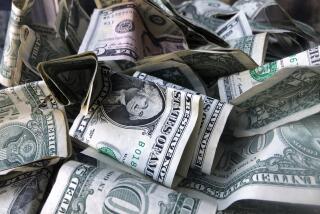Caution’s the Word in Rare-Issue Deals
Question: I was interested in investing in rare coins a couple years ago, but soon realized I would never learn enough about rare coins to be able to make my own purchases and realize a profit in due time. What is your opinion of those companies that advertise to invest in rare coins with them? I have received information from two of these companies. Without naming either company, they both claim a profit between 20%-30% a year over 10 years.--G.S.
Answer: The upward surge of gold and silver prices is bound to bring with it renewed interest in investment-quality coins. The large turnout at last week’s coin show in Buena Park is an indication of collector demand and perhaps a portent of what to expect at the upcoming Glendale Coin and Stamp Exposition on May 22, 23 and 24. Between now and then, dealers expect an active market due to the first signs of inflation and higher interest rates.
Gold and silver, traditional hedges against inflation, become even more attractive to investors when the rare-coin factor is taken into consideration, because rare coins usually hold their value regardless of bullion prices but tend to increase considerably during hard times. Obviously, the time to buy is before prices begin their upward climb. There’s no way of knowing when new investors should enter the market, although you can probably expect to hear from considerably more companies touting rare coins as bullion prices heat up.
I can understand your dilemma regarding the advertisements you have received. Frankly, there’s no way of evaluating these companies through their claims. But I don’t imagine many investors know much about the automobile business, either, when they buy stock in General Motors, Chrysler or Ford. The point is, it helps to know as much about rare coins, if you are going to invest in them, but it’s equally important to know as much about the seller. One option is telemarketing, where you’re contacted by telephone. Many dealers believe telemarketing has given numismatics a black eye. Purchasing coins this way can be risky, indeed.
Another option is through companies that contact you through the mail or newspaper advertising. You can also purchase directly through coin dealers and at coin shows, where it’s possible to comparison shop.
Ideally, it’s best to see each coin before you make a purchase. It’s best to discuss the coin directly with the dealer. It’s best to have a buy-back agreement at the same grade the coin was purchased and a return guarantee.
Try to work with a professional numismatist who has been at the same location for many years. Get to know your dealer and let him know your investment objectives. Learn as much as you can about coins. Who knows? Your investment might turn into your hobby.
Coin News
The Royal Canadian Mint has denied a report in the April 13 edition of the Wall Street Journal suggesting that buyers of the gold Maple Leaf were being shortchanged. “The suggestion that the gold Maple Leaf might be underweight is untrue,” the Royal Canadian Mint said. “All gold Maple Leaf coins, regardless of denomination, are guaranteed to contain more than legal minimum weight and are all superior to the mint’s stated claim of .9999 fineness.”
Don Alpert cannot answer mail personally but will respond to numismatic questions of general interest in this column. Do not telephone. Write to Your Coins, You section, The Times, Times Mirror Square, Los Angeles 90053.
More to Read
Inside the business of entertainment
The Wide Shot brings you news, analysis and insights on everything from streaming wars to production — and what it all means for the future.
You may occasionally receive promotional content from the Los Angeles Times.










